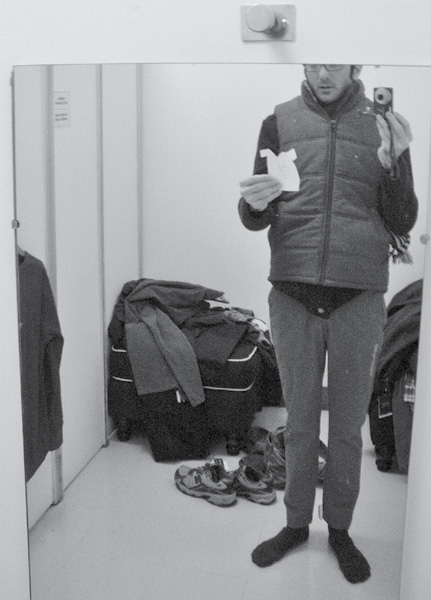
AN ATTEMPT TO INDEX THE ORIGINS OF MY CLOTHING
first performed on December 28, 2012
Kohl’s department store fitting room, North River Shopping Plaza, Pembroke, MA / Sears’ Land’s End fitting room, Hanover Mall, Hanover, MA / J. Crew fitting room, Derby Street Shoppes, Hingham, MA /Gap fitting room, South Shore Plaza, Braintree, MA
performed once in 2012
ANDREW K. PETERSON
Marshfield Hills, MA
AN ATTEMPT TO INDEX THE ORIGINS OF MY CLOTHING
ANDREW K. PETERSON
Certain socialized, public spaces emphasize the increasingly blurred distinction between public and private aspects of life. In places like bathrooms, locker rooms and changing stations, individuals share the common activity of removing clothing—is this the body’s vulnerable nature? While participating in a social activity, actively experiencing a common action, the structure of these places (divided stalls, curtains, etc.) allows for a certain amount of privacy and anonymity. It doesn’t take much, however (a loud sound/conversation), to remind us of the tenuousness of this privacy due to the proximity and presence of others. Our experience is seldom, if ever, “ours” alone. From a nude stranger one shower stall away, to a garment worker sewing jeans in a factory half a world away, our lives are inextricably bound to others.
While clothes shopping, I took potential purchases into the fitting rooms of clothing stores—Kohl’s, Sears, J. Crew, the Gap—in shopping malls. While wearing the store’s clothes in the dressing room, I read aloud from a poem, “An Attempt to Index the Origins of My Clothing.” This “quadruple sonnet” is a list of the countries of origin of the clothing I own. Reading this aloud, I hoped to bring to attention more mindful consumption practices, as a reminder to myself, and any other consumers within earshot, in such a place designed to emphasize personal “reflection” (in the physical sense, the mirror) over social reflection.
The poem’s strict pentameter allows for various enjambments. Perhaps emphasizing the distance between the conditions of the garment’s production and consumer’s purchase? For example,
Myanmar, USA, USA, Chi
na, China, Korea, India, Chi
na, Cambodia, Sri Lanka, Mauri
tius, China, Mauritius, Jordan, China,
Bonding materiality of language to the clothing, I cut out each stanza into the shape of a t-shirt on a piece of paper. The back of the paper reads, “where am I from?”
This performance implicates me in the consumer process, revealing my own practices, and distances’ blindness. Our clothes protect our bodies, provide a sense of style, keep us warm. Clothes are also a thin membrane that provides proof of our connectivity, our engagement in a global economy that provides protection and wealth for some, exploitation and further suffering for others.
After reading each stanza, I placed the poem in the pants’ pocket and returned the un-purchased article back on the store shelf. My hope is the future owner of the pants may find the poem.